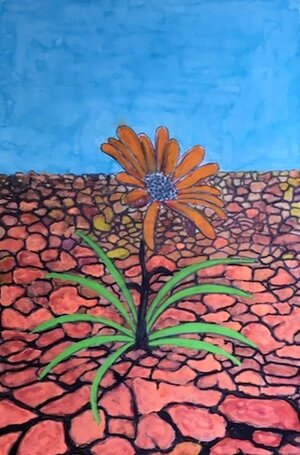Sahel Flower | Jean Guerly Petion
Wounded Land
Let me pray
With all my strength
With all the strength of my heart and of my blood
For this Sahelian land
Six million Nomads marching on
Gnawed by hunger to the belly
Twenty million cattle
Thirsty and famished bellowing
And nothing but skin and ribs
They dig and dig
The scarce blade of grass
As it flies away
Offers their moans to the passing wind
They wonder where
Their impetuous fate pushes them
And if they will be left to starve
Nonexistent wretches saddled by wretchedness
They resemble hard stones
Lifeless and dry
Slowly lumbering
Their desperate way
Praying for death
For this supreme happiness to come
All along the Sahara desert
From Africa to Asia
And
Powerless I cannot erase
Each tear
Each pain
Each moan
Powerless I say
In their lifeless life
I pray for this supreme happiness
O my Glory
For tomorrow’s dawns
In which the rays of light slip into the days
When the waterfall burbles
Erasing the sobs that break their voices
Bathing and flooding this land
Erasing from wan-eyed faces
The harrowing look of pain
Of those who cease asking for anything
After as many days of misery
As there are palm-trees
Allow, O my Glory
Their unhappy and hopeless nights
To become happiness and light
Like that of the noon-sun
O let the water be!
Let it rush from the sky
The grace of rain
Let wells and fountains and springs burst forth
Let the thirsty one drink
Let the famished one eat
Let my wounded land
My whole wounded land
Be green again and covered with flowers
O Lord
Can’t our cries
Arouse Your mercy
Arouse Your pity anymore
Mercy O Lord
Have mercy on my land
Take off and fly free
O my land
Beyond the Cosmos and beyond the Universe
A thousand blessings
O my Glory
I implore you with an ardor
Born of despair
A thousand blessings
To Africa and Asia.
Kiné Kirima Fall (Author) / Sylvie Kandé (Translator)
Born in 1934 in Rufisque, Senegal, Kiné is a self-described self-taught woman poet and the author of the poetry collections Chants de la rivière fraîche (NEA, 1976) and Élans de grâce (Éditions CLE, 1979). She was praised by Leopold Sédar Senghor, who wrote the preface to her first collection, noting her unique ability to bring together sensuality and spirituality. She has worked as a news journalist, but has always preferred introspection to social life.
Born in Paris to a French mother and a Senegalese father, Sylvie is the author of three collections of poetry published by Gallimard. Trained as both a literary critic and a historian, she is also known for her work on the complex conversations that have taken place between Africa and Europe and Africa and its Diasporas. Her areas of specialization include métissage/hybridity and postracial utopias. She lives in New York City, and teaches at SUNY Old Westbury.








